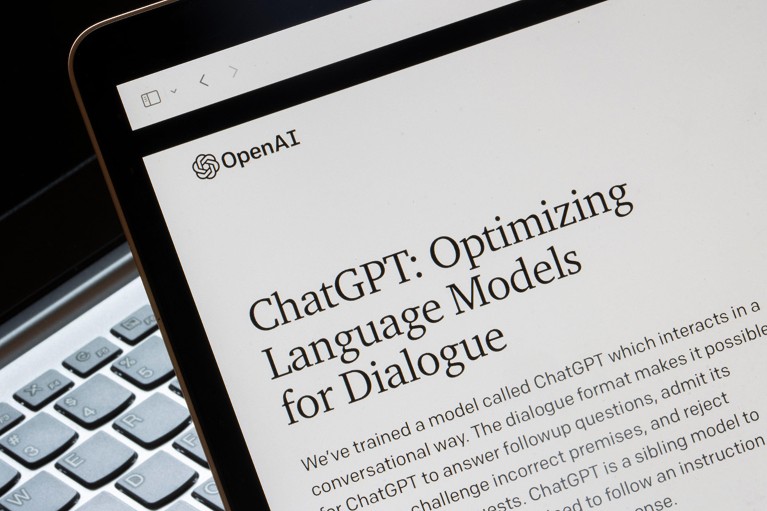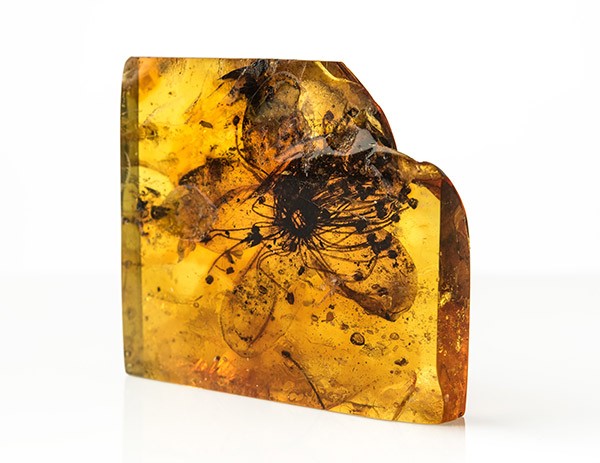Hello Nature readers, would you like to get this Briefing in your inbox free every day? Sign up here

Scientists and publishing specialists are concerned that the increasing sophistication of chatbots could undermine research integrity and accuracy.Credit: Ted Hsu/Alamy
The artificial-intelligence (AI) chatbot ChatGPT can write fake abstracts that scientists have trouble distinguishing from those written by humans. The chatbot was asked to create 50 abstracts on the basis of the titles of articles in five high-impact medical journals. Reviewers spotted only 68% of the ChatGPT abstracts — performing roughly the same as AI-detector software. Researchers are divided over the implications: some find it worrying, but others think that serious scientists are unlikely to use AI-generated abstracts.
Reference: bioRxiv paper (not peer-reviewed)
The debate over the best design for mRNA in COVID-19 vaccines has been settled: chemically modified mRNA comes out on top. A vaccine made with modified mRNA elicited the same immune protection and caused fewer side effects at the same dose as a version with ‘natural’ mRNA in a comparison by vaccine maker CureVac. This means that the dosage can safely be increased for maximum protection. CureVac had long remained a proponent of ‘unmodified’ mRNA, even after Pfizer–BioNTech and Moderna had success with next-generation mRNA COVID-19 vaccines. The company has now switched its entire infectious-disease vaccine portfolio, leaving only a few ‘unmodified’ COVID-19 jabs under development in Asia.
US President Joe Biden’s administration has unveiled a long-awaited plan to prevent political interference in science conducted at government agencies. The plan aims to strengthen, expand and standardize scientific-integrity policies across agencies and establish an integrity panel to investigate violations by senior officials and political appointees. Government watchdogs praised the plan, but say further steps are needed to secure the role of scientists in government decision-making and prevent the type of political meddling that was reported under former president Donald Trump.
Reference: White House framework document
Image of the week

This nearly 40-million-year-old flower is by far the largest floral fossil ever discovered preserved in amber. Flower inclusions usually do not exceed 10 millimetres — this one is 28 millimetres across. But the sample, from the Baltic forests of northern Europe, sat in a German museum case and hadn’t been analysed for more than 150 years. Researchers extracted pollen from the sample and say it is closely related to the Asian species of Symplocos. They propose a new name for the flower: Symplocos kowalewskii. (Scientific American | 4 min read)
Reference: Scientific Reports paper (Carola Radke, MfN (Museum für Naturkunde Berlin))
Features & opinion
Policymakers can stop worrying that offering cash to people who get their jabs could have unintended negative consequences. Trials in Sweden and the United States have shown that monetary incentives don’t reduce people’s trust in vaccine safety or erode their altruism. Communities that can afford incentives can now consider this approach, alongside improving vaccine access, without having to rely on untested assumptions, argues a Nature editorial.
Futures: science fiction from Nature
In the latest short stories for Nature’s Futures series:
• The echo of a space-weather report prompts some homespun wisdom in ‘Sailors take warning’.
• There are lessons for us all in ‘Excerpts from the User Guide for the SynaTech-3411 3D Bio-Printer (the bits you actually bothered to read)’.
Andrew Robinson’s pick of the top five science books to read this week includes a breathless scientific narrative of the COVID-19 pandemic and an exploration of the ancient world power of Nubia.
This week, I spoke to the Nature Podcast about some of the most compelling science stories that you might have missed during the holiday season, including the new president of Brazil’s environmental policies, how glass frogs switch on their ‘invisibility cloak’ and what noises dinosaurs might have made.
Nature Podcast | 26 min listen
Subscribe to the Nature Podcast on Apple Podcasts, Google Podcasts or Spotify.
Today Leif Penguinson is concealed in the Murchison River Gorge in Australia’s Kalbarri National Park. Can you find the penguin?
The answer will be in Monday’s e-mail, all thanks to Briefing photo editor and penguin wrangler Tom Houghton. Because you’re getting the weekly edition, you’ll have to switch to the daily to see it — please update your preferences if you’d like to make the change.This newsletter is always evolving — tell us what you think! Please send your feedback to [email protected].
Thanks for reading,
Flora Graham, senior editor, Nature Briefing
With contributions by Katrina Krämer and Dyani Lewis
We’ve recently launched two new e-mails you might like. They’re free, and of course you can unsubscribe at any time.
• Nature Briefing: Cancer — a new weekly newsletter written with cancer researchers in mind. Sign up here to receive the next one.
• Nature Briefing: Translational Research covers biotechnology, drug discovery and pharma. Sign up here to get it free in your inbox each week.

